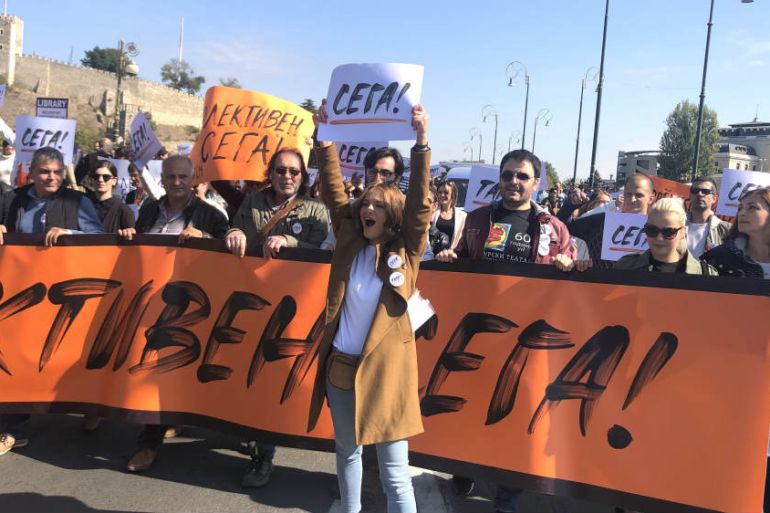Protesting North Macedonia cultural workers make breakthrough
Opera singers, actors and archaeologists among those on the streets of Skopje demanding a new union-government contract.

Skopje, North Macedonia – “Direct action gets satisfaction” has become a rallying cry for union activists here, convinced that talking has taken them as far as it can; that the time has come to stand up and “do something”.
On Tuesday in Skopje, approximately 800 members of the Cultural Union for the Republic of Macedonia and their supporters took their demands for a new collective bargaining agreement directly to the government and the Ministry of Culture.
Keep reading
list of 4 itemsUK returns looted Ghana artefacts on loan after 150 years
Fire engulfs iconic stock exchange building in Denmark’s Copenhagen
Inside the pressures facing Quebec’s billion-dollar maple syrup industry
Within 20 minutes of the protest beginning in front of the Vlada – the office of the prime minister – union president Sanya Arsovska received a message from the office of Prime Minister Zoran Zaev, requesting a meeting on October 24.
The union represents people working in arenas as diverse as the national theatre, opera, and ballet to libraries and museums around the country. The last formal contract between the union and the government was signed in 2005.
“This is a huge success,” Arsovska, a well-known actress, said of Zaev’s invitation. And it did not come a moment too soon for union members who said they have struggled under the existing wage structure. “We have members with PhDs working at archaeological sites and museums, and they’re making about 300 euros ($330) a month,” Arsovska told Al Jazeera.
Goce Pavlovski is one of those archaeologists, and curator at the National Institution for Management of the Archaeological Site of Stobi, a city dating back to the second century BCE, home to vast ruins from the Roman era. With a master’s degree from Skopje University, Pavlovski feels he is undervalued, and his wages reflect that.
“Devoting your whole life to the protection of heritage and culture, to its research and presentation, to its popularisation in society … this is one of the trademarks of this country,” he said. “But it’s quite frustrating [to be underpaid], because in a normal country you would have a much better status in society.”

Robert Alagjozovski, a former minister of culture currently serving as Zaev’s national coordinator for the development of culture, said the prime minister is sensitive to the workers’ demands and respected their contributions to national heritage. Improving their wages is a central plank in the Social Democrats’ party platform.
“[Social Democratic Union of Macedonia] philosophy is to care for the employees, and a rise in salary is our general policy,” Alagjozovski told Al Jazeera.
Zaev inherited a problem that bled over from his predecessor’s ad hoc approach to dealing with unions, Alagjozovski says. The government of Nikola Gruevski has been accused of widespread political patronage during its 11-year reign until 2017, using the government purse to reward friends and punish perceived enemies. Gruevski currently lives in Hungary, where he received asylum as a fugitive from a public corruption conviction and prison sentence in North Macedonia.
Fifteen years without a contract is long enough
After the last nationwide contract with the culture worker’s union expired in 2008, the Gruevski government made deals with institutions and small groups of employees, resulting in widely inconsistent pay rates and workplace rules, even for people doing the same work, Alagjozovski says. While Alagjozovski was culture minister, an investigation showed wage disparities of up to 60 percent from one location to another.
“We have begun a ‘levelling process’ to resolve those discrepancies,” he said, citing the commitment of 2.5 million euros ($2.7m) annually to bring salaries up to scratch for 90 percent of culture workers, while seeking funding streams to ensure those gains are sustainable.
“I’m optimistic that we can make that happen,” Arsovska said. An additional two million euros annually are needed to satisfy the workers’ demands, she added, but most importantly, she has one non-negotiable demand for her meeting with the prime minister.
“We want a collective agreement in place by January 1, 2020, and not a day later,” she said. “Fifteen years without a contract is long enough.”